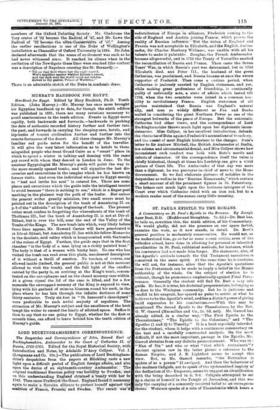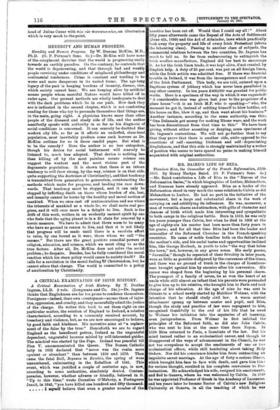ST. PAUL'S EPISTLE TO THE ROMANS.
A Commentary on St. Paul's Epistle to the Romans. By Joseph Agar Beet, D.D. (Hodderand Stoughton. 73. 6d.)—Dr. Beet has, he tells us, rewritten this, the ninth edition, of his Commentary. We would gladly, did not the pressure on our space forbid, examine the work, as it now stands, in detail. Dr. Beet's general position is moderately conservative. He would not, as we understand him, go so far as some recent critics, even of the orthodox school, have done in allowing for personal or inherited peculiarities in St. Paul, rabbinical methods, for instance, which his conversion had not made him forget. His statement, also, of the Apostle's attitude towards the Old Testament narratives is conceived in the same spirit. At the same time he is cautious. Lie will not, for instance, allow that the Apostle's quotations from the Pentateuch can be made to imply a belief in the Mosaic authorship of the whole. On the subject of election he is reticent, though he pronounces emphatically against Final Perse- verance. Generally the student will find Dr. Beet. a very safe guide. He has, it is true; his doctrinal prepossessions, belonging as he does to the Wesleyan community. But he is judicious and candid in his exegesis, has spared no pains to arrive at what he believes to be the Apostle's mind, and has a distinct power of giving lucid expression to his conclusions.—With this may be mentioned The Second Epistle to the Thessalonians, by the Rev. G. W. Garrod (Macmillan and Co., 2s. 6d. net). Mr. Garrod has already edited, in a similar way, "The First Epistle to the Thessalonians," "The Epistle to the Colossians," and "The Epistles (1 and 2) to Timothy." It is a book especially intended for the student, whom it helps with a continuous commentary on the text and a carefully constructed analysis. On the mo4t difficult, if not the most important, passage in the Epistle, Mr. Garrod abstains from any definite pronouncement. Who was th "Man of Sin" and who or what "that whieh restraineth"? Ancient opinion saw in the latter phrase a reference to the Roman Empire, and J. B. Lightfoot seems to accept this view. But, as Mr. Gassed remarks, "the Restrainer is spoken of as a person" (6 Karxwy). And then the behaviour of the madman Caligula, not to speak of the -systematised impiety of the deification of the Emperors, seems to suggest at identification with the being described in ii. 3-4. Caligula attempted to set tip a statue of himself in the Temple at Jerusalem, and this was only the carrying of a commonly received belief to an outrageous excess. Wetstein speaks of a coin of Thessalonica' *bleb bears a head of Julius Casa/. with BeNs Zv OicraaXovodwv, an illustration which is very much to the point.



















































 Previous page
Previous page